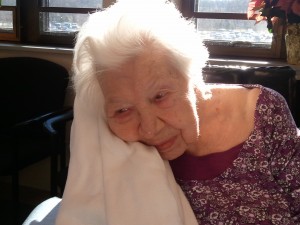 The all-purpose room has cream-colored walls. Its linoleum floors shine. The
The all-purpose room has cream-colored walls. Its linoleum floors shine. The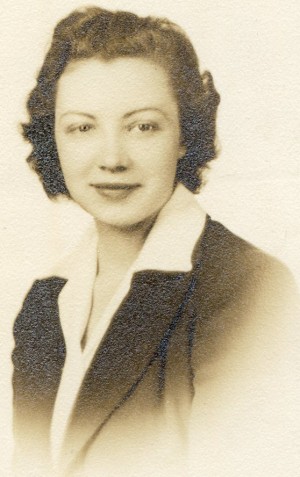 attendants are all women; they seem to like their jobs. They move smoothly from table to table – delivering trays, smiling and brightly greeting the men and women who wait in wheelchairs. Two come to our table and pass a good afternoon to my mother by her name, Christine. She smiles at them, the sweetness of her temperament undiminished. Surrounding all this, Nat King Cole is singing “Rambling Rose.” Dean Martin had a turn before him, and then came the theme from Zorba the Greek, the one played over the scene where Anthony Quinn and Alan Bates dance the Kalamatiano on the beach after they have lost all their money.
attendants are all women; they seem to like their jobs. They move smoothly from table to table – delivering trays, smiling and brightly greeting the men and women who wait in wheelchairs. Two come to our table and pass a good afternoon to my mother by her name, Christine. She smiles at them, the sweetness of her temperament undiminished. Surrounding all this, Nat King Cole is singing “Rambling Rose.” Dean Martin had a turn before him, and then came the theme from Zorba the Greek, the one played over the scene where Anthony Quinn and Alan Bates dance the Kalamatiano on the beach after they have lost all their money.
My mother cannot feed herself any more. All her food must be pureed because she has difficulty swallowing. Arriving at lunch time, I sat next to her and offered up spoonfuls of meat loaf and mashed potatoes and tilted sips of water and milk. My brother and sisters have done the same and more. My sisters do her laundry and decorate her room for each holiday. When my brother is in town, he dotes upon her, music that pleases her playing over his I-Pad.
She no longer remembers much of anything, but, paradoxically, her wit has sharpened with us. Her word-play has a compressive, poetic quality to it, as if that part of her brain has retained the core of its love of language. As I feed her, we chat in our own way.
She says, “You’re a real marvin.” I ask what she means. She replies, “Why are you such a slow mover?” “Slow,” I say, “How am I slow?” Recently, after I showed her photos of Amerlia Earhart’s and Charles Lindbergh’s planes she said, “Flightmen can fly. Wise men can fly.” “Do I call her X?” [who?] “Earth!”
Back and forth we go. My goal in these conversations is to make her laugh but also to mix in questions meant to probe her memory. “Were Annette and Rosemary in to see you?” “The King is coming to visit!”* “What do you remember of “Auntie Glady and Auntie Elsie?” “Has Charlie been here today?”
She rarely registers a memory. She evades most questions with some sly variation of “Why, you know that? Why should I tell you?”
She tells me that she’s had enough food. Our pace of conversation slows … slows … stops and her head tilts, her eyes close and she falls 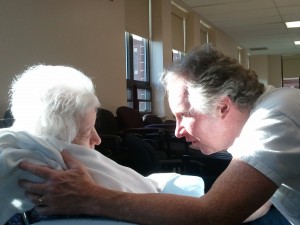 asleep in her wheelchair — the disciplinarian, the keeper of the Faith, the tender of the sick, the baker, the one who kept the house spotless, the keeper of the laundry, the protector of daughters, the one who fell asleep on the couch waiting up for us, who made sandwiches for our friends, who listened to us tell our stories as we ate. I kiss her and sit back for a moment. I have to go.
asleep in her wheelchair — the disciplinarian, the keeper of the Faith, the tender of the sick, the baker, the one who kept the house spotless, the keeper of the laundry, the protector of daughters, the one who fell asleep on the couch waiting up for us, who made sandwiches for our friends, who listened to us tell our stories as we ate. I kiss her and sit back for a moment. I have to go.
I cannot visit my mother without thinking of my father, dead since 2004.
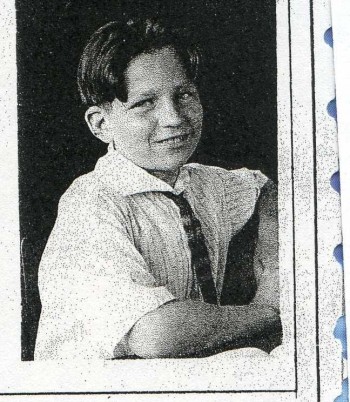 As he aged, his legs bowed more and more until he walked like an Apache who had spent his life on horseback. Finally, he used a walker. His mind remained untouched, but he became quieter, almost silent; a story teller all his life, he now adopted silence. Maybe he was worn out. Maybe he wanted to listen to others’ stories and settle into the comfort of sitting in the middle of conversation and laughter, acknowledged but at rest, a part of the scene, and still, no matter what, the unquestioned patriarch.
As he aged, his legs bowed more and more until he walked like an Apache who had spent his life on horseback. Finally, he used a walker. His mind remained untouched, but he became quieter, almost silent; a story teller all his life, he now adopted silence. Maybe he was worn out. Maybe he wanted to listen to others’ stories and settle into the comfort of sitting in the middle of conversation and laughter, acknowledged but at rest, a part of the scene, and still, no matter what, the unquestioned patriarch.
My mother took care of him. After they moved in with my sister, Annette and their brother-in-law, Jack, whom they loved as a son, he became her whole purpose.
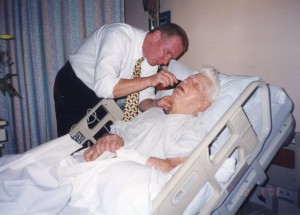
Shaving Dad
In this final narrowing of their lives, Dad sat on Jack’s deck, set his gaze on the trees and surveyed this smaller world. He had done this on the porch at his home in West Lawn. I can now see that this was a cop’s habit. In the summer he sat in a rocking chair, drinking a beer and watched the street, his eyes following the passing cars, his head slowly turning to the left and right; night falling, he remained, the big trees on our street beginning to catch the evening breeze, the light on Woodside Avenue filtering through the leaves, somewhere nearby a Phillies game faintly falling through the darkness. I wonder now if, consciously or unconsciously, he wasn’t making sure that all was safe in his neighborhood. Then, suddenly, here he was close to 90 and looking out over a lawn to a hollow filled with birds and deer. I wonder what he replayed in his mind’s eye.
Mom became more voluble, more outspoken, her wit grew edges. Sometimes I felt as if I was seeing her as she had been as a young woman, someone independent and unafraid, strong enough to have rebelled against her mother, worked her way into a supervisor of more than a dozen other women on the night shift switchboard at Bell Telephone and tamed my father of his bachelor ways.
When their bodies began to fail, both showed remarkable grace and poise, more than I could have mustered. For my father especially, it felt sometimes as if he had found a way to detach his spirit from his body, as if his acceptance of his failing legs and strength, his need for assistance in showering and other functions were no longer a part of his life – his body became only a shell and a fact that mattered more to us as we watched its health, but his humor and appetite never flagged. He was never depressed.
As he aged he dreaded the possibility that he could end his days in a nursing facility, the worst places on earth as he saw them. This was a man who had spent his working life on highways in a flow of movement, who had carried a badge and a gun and the authority of the State, who had commanded men and faced down tough characters. Now the man who once seemed made of shards of iron, who had a gaze like a basilisk, who, arrayed in his uniform seemed like a colossus of dignified, formidable authority, I helped into bed after his shower, and when he had turned onto his right side and drawn the sheet up to his chin, he would say “Thanks Mike,” and I would draw my hand through his white thatch of hair and murmur good night.
My mother faded after his death in 2004. She would spend some nights walking the circuit through the living room and into the hallway, taking a right past the bedrooms and another right past the bathroom and into the kitchen. She lifted the walker and placed it down in a rhythm of thump-shuffleshuffle-thump — continuously murmuring, sometimes calling out, sometimes disoriented and seeing people who were not present. Once, when my sister and her husband were traveling, I awoke to find her standing over me and calling my name, asking if I had had enough to eat. When she fell and broke her hip, her needs were so great that she could no longer be cared for in my sister’s home. She is kept warm and safe, but she lives away from us. None of us have become used to this hard truth of the consequence of a long life. None of us like this part. If we had the money and the space, we would hire a battery of nurses to help care for her at home. When we leave, even on her good days, maybe especially on her good days, it feels as if we are bearing a stinger from a hornet.
I dread the reign of King Time in these places — its endlessness is its chief cruelty and the one that I think about often. She seems mostly unaware of its passing, but I have my doubts. So little changes — pureed food sitting in pastel clumps comes three times a day, the strong lights of the all purpose room never vary in intensity, the big-screen TV pumps out its background noise and flickers, the wheelchair never moves unless pushed by another — the daily reality of that very incomplete list of routines would be a trigger to drive me mad. None of us can be sure about what goes on inside her consciousness.
But these too however have become a part of her last years — she can laugh. She can respond. She can smile. She can still stir the drink. For example, a few days ago, I sat at the lunch table with her and with Jessica, an aide, and three other residents suffering from various stages of dementia: Eleanor, who told me that I was cute, and after I told her that her smile reminded me of an old girlfriend’s whose name had also been Eleanor, raised her compliment to “You’re a good looking man Mike.” My mother jumped in and said, “Michael. His name is Michael.” I think that the woman on my left, wide-eyed and upright in her chair, with a completely empty electric smile, was singing a Pennsylvania German hymn. My Mother turned to her and said, “That’s a good one. Everybody’s got your thunder number.” The big man across from me, big-shouldered and years younger than me was humming. Jessica was holding Eleanor’s left hand while feeding the humming gentleman and the hymn singer and Eleanor who wanted nothing except her twin sister, Elaine, back alive again which prompted my Mother to start speaking to my older sister, Annette, through an imaginary phone I was holding and saying, “X, M, Echo. C Sey So.” This is opera bouffe. Mom was laughing. Eleanor was laughing and then crying and laughing, shaking, her mouth open gleefully. Jessica was laughing. The singer continued to sing. The big man, eyes closed, whirred away with his unknown tune. I was laughing, and I knew that tears barbed the circle of our laughter.
When I’m leaving her this time, I weave my way through the chairs and supine bodies, and I remember, inexactly, a line from a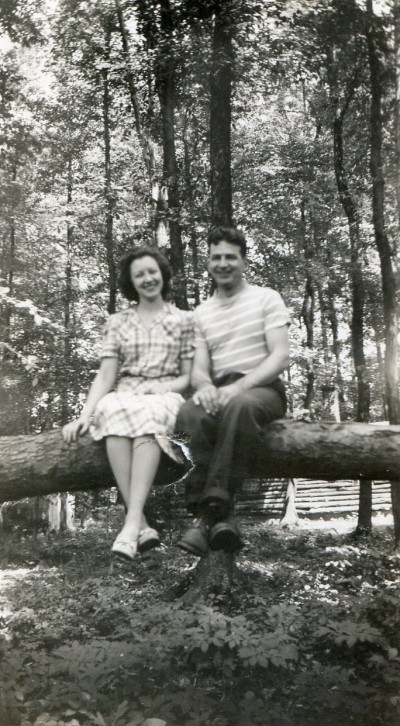 poem. At home I look it up and get it right: “Everyone waiting here was once in love.” ** I want to remember that, always. All these crooked bodies and bewildered minds were once straight and clear and once held intimate and dear others who they believed in more than their own lives. I want to keep the image of my parents sitting together on a tree trunk at a summer picnic before their marriage as the crystaline instant of their happiest, shining selves. I know that such a wish is merely an invention and perhaps even a sentimental lie. I know what inexorable, obscene conclusions time delivers and is delivering. Simultaneously, I also know that our memories of those who are meeting their end and those who have passed it are all that preserves their final arsenal of meaning and dignity. They are going or gone. We who remain remember and may smile. Perhaps that is only an ineffectual, absurd act, but as long as we can bring them back in our thoughts and stories, time will not have done its final work. The living must call forth those who can no longer remember. The living must summon the dead.
poem. At home I look it up and get it right: “Everyone waiting here was once in love.” ** I want to remember that, always. All these crooked bodies and bewildered minds were once straight and clear and once held intimate and dear others who they believed in more than their own lives. I want to keep the image of my parents sitting together on a tree trunk at a summer picnic before their marriage as the crystaline instant of their happiest, shining selves. I know that such a wish is merely an invention and perhaps even a sentimental lie. I know what inexorable, obscene conclusions time delivers and is delivering. Simultaneously, I also know that our memories of those who are meeting their end and those who have passed it are all that preserves their final arsenal of meaning and dignity. They are going or gone. We who remain remember and may smile. Perhaps that is only an ineffectual, absurd act, but as long as we can bring them back in our thoughts and stories, time will not have done its final work. The living must call forth those who can no longer remember. The living must summon the dead.
** “Old Folk’s Home, Jerusalem” by Rita Dove, 1985
*We affectionately refer to my brother, the oldest of the children, as The King.
Mike: This is a beautiful ‘remembrance of things past’. Thanks for writing it. I can see Mom and Dad reading your posts and anxiously waiting for the next one, wondering what it will say.
Mike, I am sitting here, just finished reading this beautiful tribute to our parents and wishing that we could turn back the years–just for a day or two–and one last time, see our parents as they used to be, full of life and energy!
Mike, I have the same pictures, the same era, the same innocence in the pictures of my parents, of my cousins, of old cars or past addresses, and I often think about how they got through the war and the rationing, how they used black, bulky phones, or the ice boxes and so many things and I miss their smiles too.